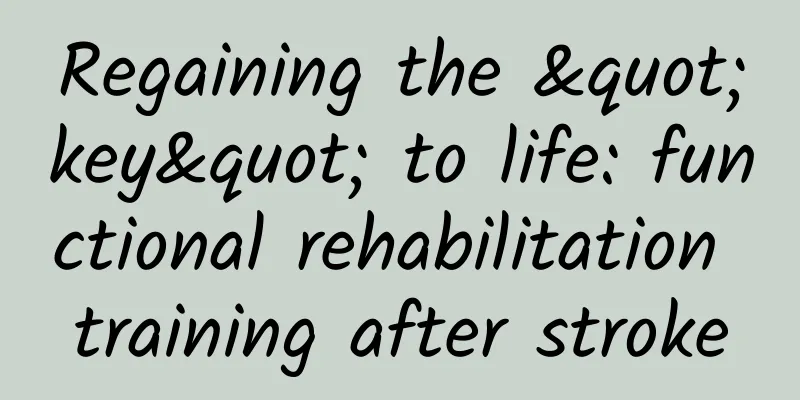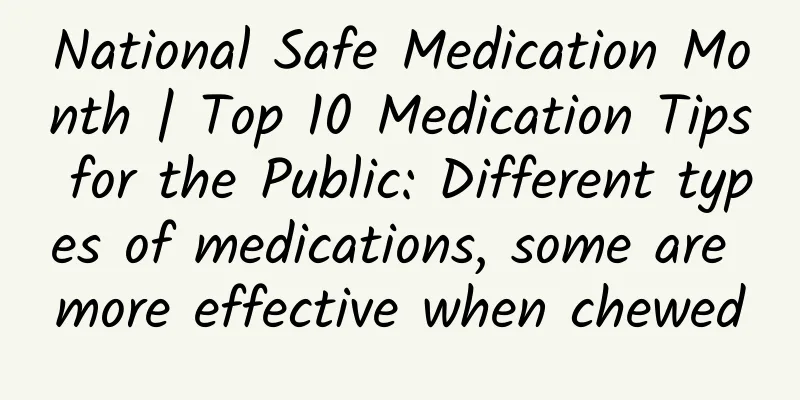Regaining the "key" to life: functional rehabilitation training after stroke

|
Author: Yao Mengna The First Affiliated Hospital of Qiqihar Medical College Reviewer: Qi Yi, deputy chief physician and associate professor of the First Affiliated Hospital of Qiqihar Medical College In daily life, we may have heard of the word "stroke", which may bring the patient's originally vibrant life to a standstill. Stroke, also known as stroke, is a disease that causes brain tissue damage due to the sudden rupture or blockage of blood vessels in the brain, which prevents blood from flowing into the brain. It not only brings physical pain to patients, but may also leave deep scars in their hearts. But please believe that through scientific rehabilitation functional training, stroke patients are completely likely to regain the "key" to life and regain their own happiness and hope. Figure 1 Copyright image, no permission to reprint 1. What challenges does stroke bring to patients? After a stroke, patients may face a series of physical and cognitive challenges. First, the dysfunction of some brain functions may cause limb weakness, numbness, and inability to maintain balance, making simple movements in daily life, such as walking, dressing, and eating, extremely difficult. Secondly, the patient's language ability may also be impaired, with symptoms such as slurred pronunciation and aphasia, which seriously affect communication and exchanges with others. In addition, stroke may also affect the patient's cognitive function, causing symptoms such as memory loss, distraction, and slow thinking, making the patient feel confused and helpless. Figure 2 Copyright image, no permission to reprint 2. Necessity of rehabilitation training for stroke patients In the face of the above challenges, rehabilitation training has become an important bridge for stroke patients to return to normal life. Rehabilitation training not only helps to restore patients' physical functions, but also gives them great psychological support and encouragement. Through planned and personalized training programs, patients can gradually improve their limb functions, language skills and cognitive levels, and gradually restore their ability to live independently. 3. Specific content of rehabilitation functional training 1. Physical therapy: rebuilding strength and flexibility In the physical therapy room, the physical therapist will develop a personalized training plan based on the patient's specific situation. These exercises are designed to strengthen muscle strength, improve joint mobility, and improve balance and coordination. Through day-to-day training, patients can gradually feel the changes in their bodies, from initial weakness to steady steps later. Every progress is a reinterpretation of life. 2. Speech therapy: making communication barrier-free The loss of language ability caused by stroke is a pain in the hearts of many patients. Speech therapists use professional training methods to help patients overcome problems such as pronunciation difficulties and aphasia. In the warm speech therapy room, patients and speech therapists work together to gradually restore language function through a series of pronunciation exercises, conversation exercises and reading exercises. When patients can express their ideas clearly and communicate smoothly with others, the joy and sense of accomplishment are beyond words. 3. Cognitive training: improving brain flexibility After a stroke, the recovery of cognitive function is equally important. The cognitive training room provides patients with a challenging and fun environment. Here, a variety of cognitive games and challenging tasks such as memory training and attention tests are displayed on a large screen. Through these trainings, patients can gradually improve their brain flexibility and coping ability, and better adapt to various needs in daily life and work. 4. Psychological support: building a "harbor" for the soul The road to recovery is not only a physical challenge, but also a spiritual one. Psychological support plays a vital role in the recovery process of stroke patients. Psychologists can guide patients to share experiences with fellow patients and rebuild a positive and optimistic attitude towards life. At the same time, the love and support of family and friends are also an indispensable source of strength for patients. Surrounded by love, patients can face difficulties more bravely and actively participate in rehabilitation training. Post-stroke rehabilitation training is a long and arduous process, but it is also full of hope and miracles. Through scientific training methods, personalized training programs and comprehensive psychological support, patients can fully regain the joy and confidence of life. Let us work together on this road of rehabilitation, light a lamp of hope for stroke patients, and illuminate their way back to normal life. |
<<: Parents with these traits are more likely to raise children with bipolar disorder
>>: Restoring freedom of movement: How to choose the right hip replacement for you
Recommend
My waist almost broke when my period came
Menstruation is a normal physiological phenomenon...
How long does it take for double eyelid scars to disappear?
A full-cut double eyelid can make the eyes more l...
With or without hair, it's different
Sexual arousal can cause the labia majora to lift...
Cesarean section anesthesia sequelae back pain
Caesarean section is a very common method of deli...
What should I do if my breasts shrink and sag?
Women don't want their breasts to shrink and ...
Can I exercise during the first three months of pregnancy?
During the early stages of pregnancy, the fetus&#...
What are the dangers of exercising during menstruation?
Many female friends have been choosing some fitne...
[Fat Bear Science] Can a mole turn into cancer when it grows? Learn these 5 tips to judge
Everyone has several or even dozens of moles on t...
Can you get pregnant if you have sex before your period?
I believe that there are still many young people ...
How to treat menstrual headaches?
Many women experience symptoms such as chest pain...
I got pregnant again right after the abortion.
Medical abortion is also a way to terminate pregn...
Areola suddenly becomes bigger, am I pregnant?
Many women find that their areola suddenly become...
The Cry of the 20th Century: Humanity's Struggle against AIDS
Author: Shurui Chen, Nagoya University School of ...
Overview of delayed periods
Delayed menstruation, also known as "infrequ...









